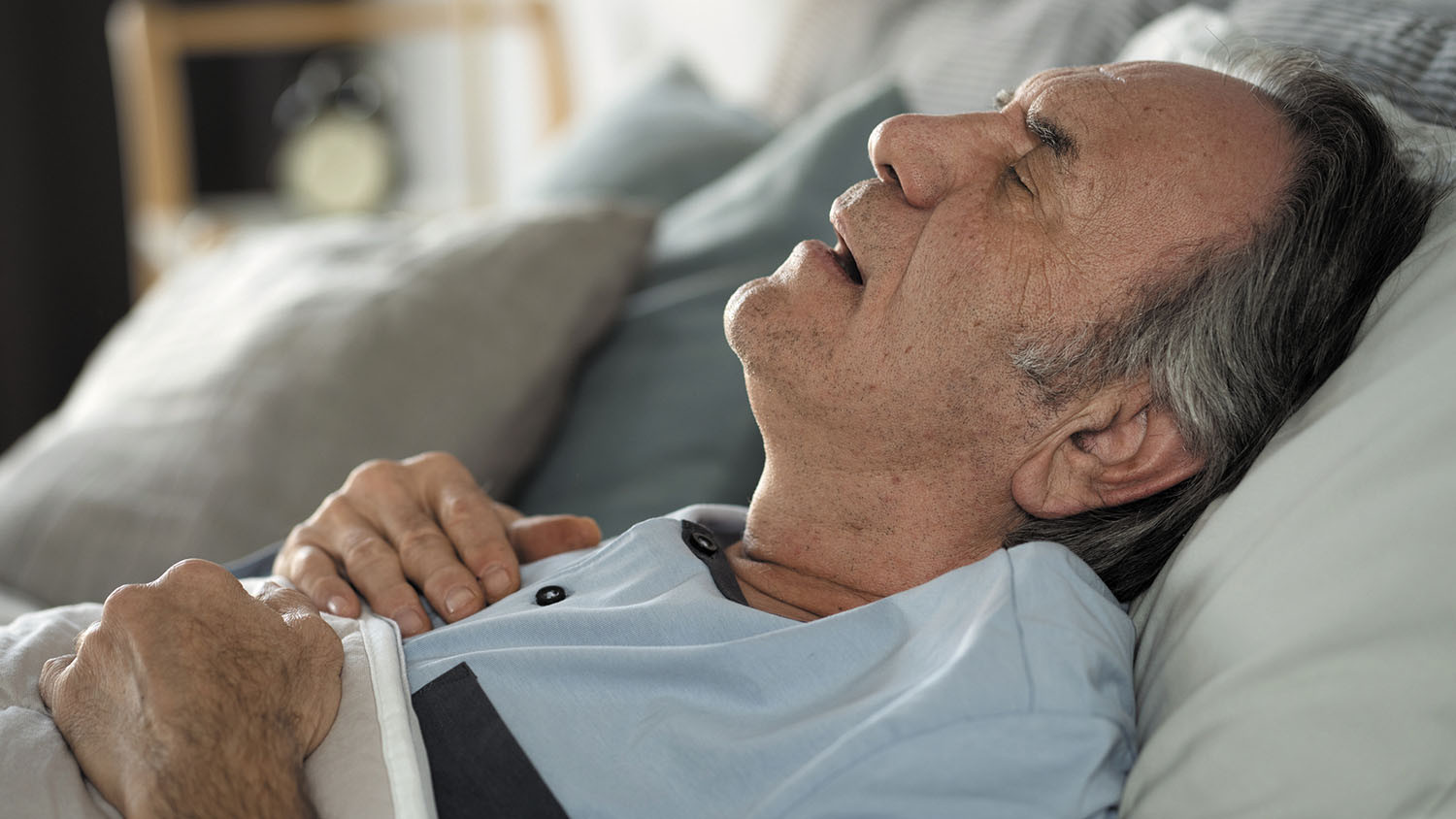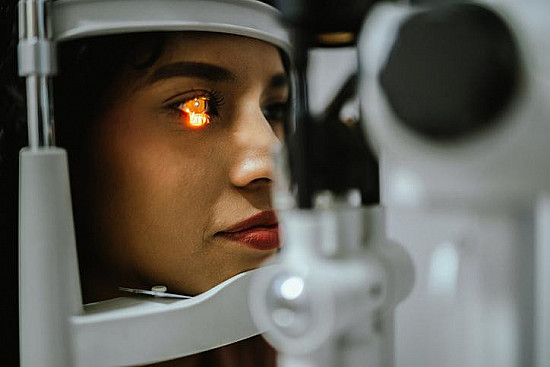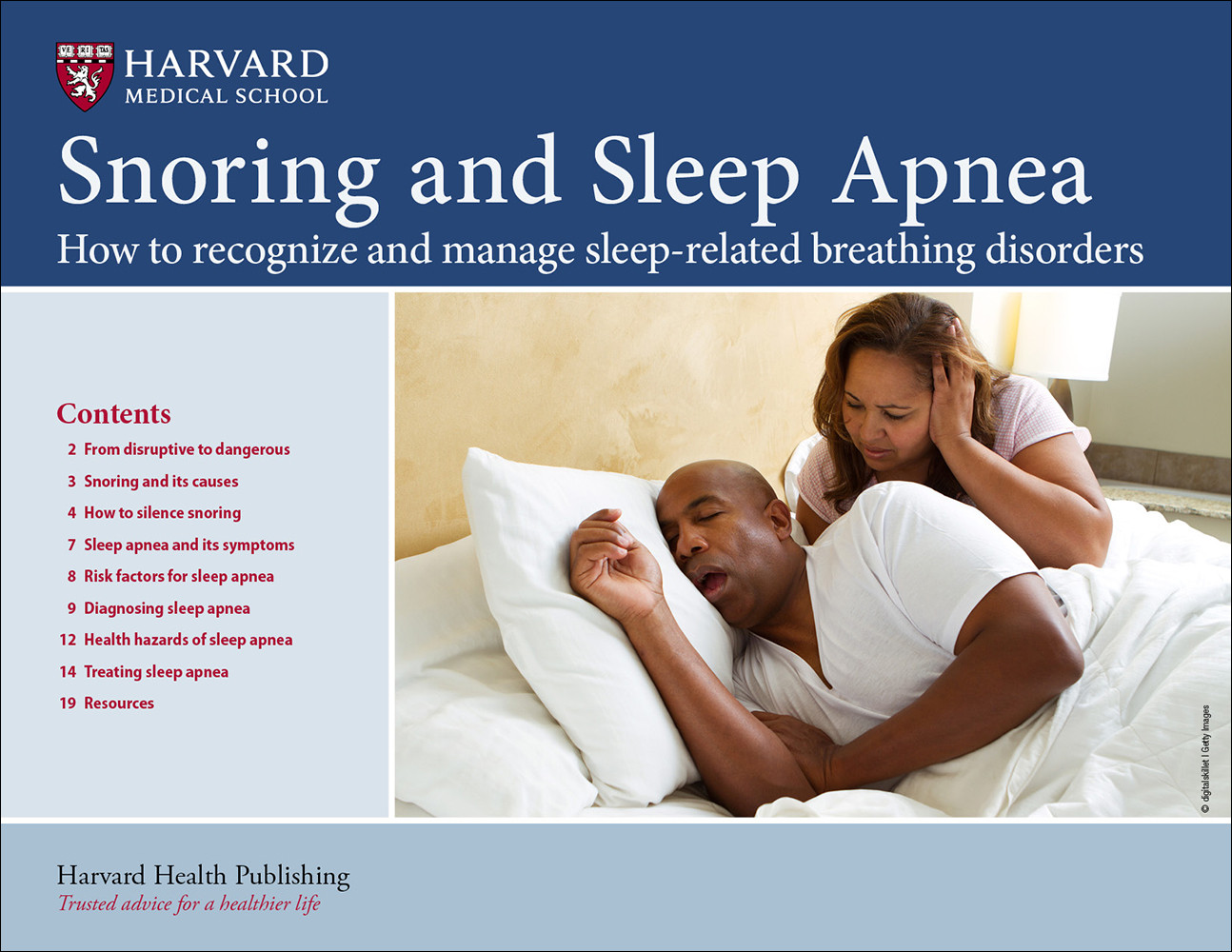Should you be tested for sleep apnea?
This sleep-disrupting disorder is common but often unrecognized in people with heart disease.
- Reviewed by Christopher P. Cannon, MD, Editor in Chief, Harvard Heart Letter; Editorial Advisory Board Member, Harvard Health Publishing

Getting a good night's sleep on a regular basis is essential for cardiovascular health. That means everyone — especially people with heart problems — should address any issues that keep them from getting at least seven hours of restorative sleep every night. One common problem is obstructive sleep apnea, a condition marked by brief pauses in breathing, often triggering loud snoring, grunts, gasps, and choking noises.
These repeated breathing disruptions cause your heart rate and blood pressure to rise, putting stress on your heart and circulation. "Somewhere between 40% and 80% of people with cardiovascular disease may have sleep apnea," says Dr. Sogol Javaheri, a sleep specialist at Harvard-affiliated Brigham and Women's Hospital. Yet sleep apnea frequently goes undetected and untreated. Why?
Often, people don't realize they are periodically gasping for air throughout the night unless a bed partner or family member notices. In addition, many people with sleep apnea (particularly those who have cardiovascular disease) don't report excessive daytime sleepiness, one of the most common symptoms of the disorder, says Dr. Javaheri. "Some people are so accustomed to sleep deprivation that they don't realize they're sleepy," she says.
Causes, risks, and other symptoms
Sleep apnea occurs when tissue in the tongue or throat temporarily narrows or blocks the airway during sleep, sometimes as many as 100 times an hour. While people of all ages and sizes can develop sleep apnea, it's most common in older people and those who are overweight or obese, as well as people with heart problems, hard-to-control blood pressure, and diabetes.
One way that doctors assess the likelihood of sleep apnea is with the STOPBANG questionnaire (see box). Other symptoms that may be caused by sleep apnea include nighttime restlessness; trouble with concentration or memory; mood changes; morning headaches; vivid, strange, or threatening dreams; and nighttime waking to urinate.
Test yourself for sleep apnea with STOP-BANG |
|
|
A "yes" answer to three or more of these questions suggests possible sleep apnea. Ask your doctor if you should have a sleep study. |
|
|
S |
Snore: Have you been told that you snore? |
|
T |
Tired: Do you often feel tired during the day? |
|
O |
Obstruction: Do you know if you briefly stop breathing while asleep, or has anyone witnessed you do this? |
|
P |
Pressure: Do you have high blood pressure or take medication for high blood pressure? |
|
B |
Body mass index (BMI): Is your BMI 30 or above? (For a calculator, see /bmi.) |
|
A |
Age: Are you 50 or older? |
|
N |
Neck: Is your neck circumference more than 16 inches (women) or 17 inches (men)? |
|
G |
Gender: Are you male? |
Diagnosing sleep apnea
If you think you might have sleep apnea, check with your doctor about an evaluation. If possible, start with a sleep specialist (or ask for a referral to one), as these experts are often better able to navigate insurance issues and recommend appropriate, timely testing and treatment. In the past, diagnosing sleep apnea always required an over-night stay in a sleep lab. Today, home-based tests (which are more convenient and less expensive) are the norm. They're recommended for people whose symptoms suggest they have moderate to severe sleep apnea and who have no other significant medical problems.
For a home sleep study, you'll get a small, lightweight monitor; a belt you slip around your midsection; a small finger clip; and a sensor to place under your nose. These devices measure your oxygen saturation (the amount of oxygen in your blood), heart rate, and airflow, as well as the movements of your chest and abdomen and your position while you sleep. If you need to use the bathroom, you just take the equipment with you.
Treating sleep apnea
Lifestyle changes that can improve sleep apnea include
- losing weight if needed
- avoiding alcohol within three hours of bedtime
- not taking medications that relax your muscles in the evening
- treating nasal congestion with medications or home remedies
- sleeping on your side or elevating your head.
People with moderate to severe apnea often need positive airway pressure (PAP) therapy, which uses a small machine to deliver pressurized air through a mask covering your nose (and sometimes your mouth) to keep your airway open as you sleep. Even people with mild sleep apnea who feel sleepy during the day may benefit from PAP, which can help people feel more alert and rested and may also improve their mood and quality of life, says Dr. Javaheri.
Image: © seb_ra/Getty Images
About the Author

Julie Corliss, Executive Editor, Harvard Heart Letter
About the Reviewer

Christopher P. Cannon, MD, Editor in Chief, Harvard Heart Letter; Editorial Advisory Board Member, Harvard Health Publishing
Disclaimer:
As a service to our readers, Harvard Health Publishing provides access to our library of archived content. Please note the date of last review or update on all articles.
No content on this site, regardless of date, should ever be used as a substitute for direct medical advice from your doctor or other qualified clinician.
















